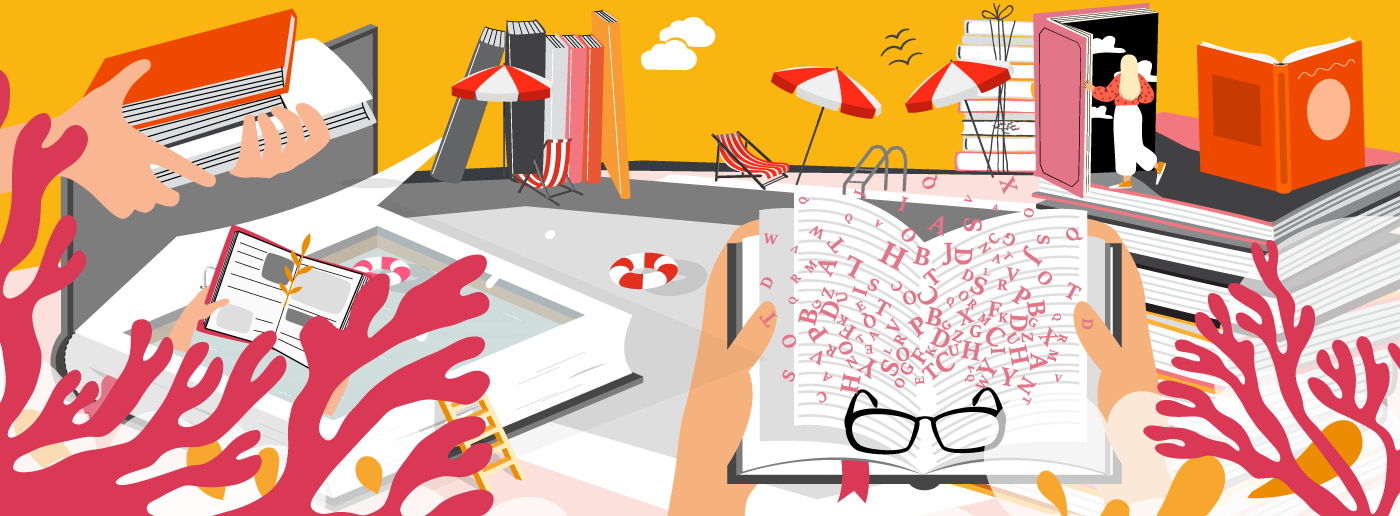A reader lives a thousand lives before he dies . . . The man who never reads lives only one.
George R.R. Martin, American novelist and short-story writer, screenwriter, and television producer.
We, the blog team, fully agree with George R.R. Martin. As avid readers, we truly believe that reading, regardless of the book, its subject or genre, has many benefits that enrich the mind, making you feel like you have experienced many lives.
But we are all living in an extremely fast-paced world, juggling with numerous commitments, so we understand that reading may not be at the top of your priority list. Yet, we have some compelling reasons why you should find the time to read and make it a habit.
For one, it’s good for your health—literally. Reading keeps your brain active and engaged, reducing the risk of cognitive decline as you age. It exercises the mind similarly to how physical activity exercises the body. Moreover, it can help improve your focus because it requires your full attention. Besides, engaging with complex plots and analysing the development of characters and themes can enhance your analytical and critical thinking skills.
Every book—whether fiction or non-fiction, a romance or a memoir—holds information and wisdom. Picture your brain as a hoarder of knowledge that makes you a more informed and well-rounded individual. Naturally, reading also improves your vocabulary as you are exposed to a diverse range of words and phrases, which in turn helps you in both written and verbal communication.
Moreover, books spark your imagination, especially fiction books. Like the wardrobe in ‘The Chronicles of Narnia’, they are magical portals that take you to different worlds, times, and scenarios, fostering your creativity and innovative thinking. You also become exposed to diverse characters and situations, which helps you develop empathy and a better understanding of people from different backgrounds and experiences.
Finally, immersing yourself in a good book can be a great way to relax and escape from the stresses of daily life. It can even be therapeutic, helping curtail anxiety or the feeling of loneliness. If anything, books can be a great source of joy and pleasure.
We hope we persuaded you, but maybe you’re just not a fan of reading. Well, you can always try audiobooks if that’s more your jam, or, as British author J.K. Rowling said: “If you don’t like to read, you haven’t found the right book.”
If so, the blog team is here to help. In this blog, each member suggests a book that spoke to them, to hopefully inspire you to broaden your mind and (re)ignite your interest in reading. And summer is the perfect time to do it, when you can take it easy, relax and reflect. We hope you discover the right book for you.
- Gerald’s Game by Stephen King
- The Alchemist by Paulo Coelho
- Small Things Like These by Claire Keegan
- The Four Agreements: A Practical Guide to Personal Freedom (A Toltec Wisdom Book) by Don Miguel Ruiz
- Kilometer Zero: The Path to Happiness by Maud Ankaoua
- Don’t Tell Me You’re Afraid by Giuseppe Catozzella
- The Road by Cormac McCarthy
- The Celestine Prophecy by James Redfield
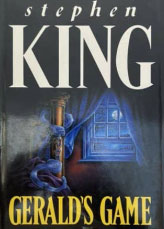
Gerald’s Game by Stephen King
This is a psychological thriller that delves into themes of survival, trauma, and inner strength. Jessie and her husband Gerald go to their secluded cabin for a weekend retreat. Gerald handcuffs Jessie to the bed as part of a game, but things take a dark turn when he suffers a heart attack and dies.
Handcuffed to the bed with no one around to help, Jessie must find a way to escape her dire predicament. Her struggle is compounded by her physical restraints and the psychological torment of being alone and helpless. The book explores:
- Psychological Journey: As time passes, Jessie experiences hallucinations and flashbacks. She confronts her traumatic past, including memories of childhood abuse. These flashbacks intermingle with her current desperate attempts to free herself.
- Inner Strength: Jessie taps into her inner reserves of strength and ingenuity to survive. She battles dehydration, fear, and her haunting memories to find a way to escape her physical and emotional bonds.
Jessie’s journey demonstrates the incredible resilience of the human spirit. Her resourcefulness in finding a way to survive against all odds is profoundly inspiring. The novel highlights the importance of facing and addressing past traumas and the transformation from a passive victim to an empowered survivor is a powerful message about personal growth and empowerment.
Overall, “Gerald’s Game” is inspiring as it illustrates the strength of the human will to survive and heal, demonstrating that even in the darkest moments, there is a potential for personal empowerment and recovery.
Oh, and one last thing: While the book is excellent, don’t watch the film of it as that’s very disappointing in comparison.
Adam Walder, Senior Associate, Financial Services Content Writer & Editorial Coordinator

The Alchemist by Paulo Coelho
This philosophical novel follows the journey of Santiago, a young Andalusian shepherd. It is a modern classic that has inspired millions with its themes of personal legend, destiny, and self-discovery. The story begins with Santiago having a recurring dream about finding treasure in the Egyptian pyramids. Encouraged by a fortune teller and a mysterious old king named Melchizedek, he sells his flock and sets off on an adventure to discover this treasure.
Along the way, he faces numerous challenges and meets several significant characters, including an Englishman, a crystal merchant, and the love of his life, Fatima. Ultimately, Santiago learns that the treasure he sought was always within him, buried beneath the sycamore tree where his journey began.
What I enjoyed in this allegorical tale is the fact that it explores profound themes about life, destiny and the pursuit of one’s dreams. The simple yet evocative prose captures the essence of a universal quest for meaning and self-discovery. The novel encourages readers to listen to their hearts, recognise the signs of the universe, and embark on their own journeys toward personal fulfilment. Santiago’s journey is indeed not just a physical quest but a profound internal transformation. He evolves from a simple shepherd into a wise individual who understands the deeper meanings of life and love.
Here are my favourite quotes from this novel as pieces of thought that I kept from my reading:
- “When we love, we always strive to become better than we are. When we strive to become better than we are, everything around us becomes better too.”
- “The simple things are also the most extraordinary things, and only the wise can see them.”
- “Remember that wherever your heart is, there you will find your treasure.”
- “Don’t give in to your fears. If you do, you won’t be able to talk to your heart.”
- “There is only one thing that makes a dream impossible to achieve: the fear of failure.”
As T.S. Eliot said: “The journey not the arrival matters.”
Amélie Bazin, Senior Associate, Content writer and editor coordinator
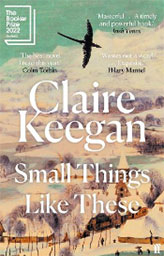
Small Things Like These by Claire Keegan
This beautifully crafted story transports readers to a small Irish town during the Christmas season of 1985. It follows Bill Furlong, a coal and timber merchant, who navigates the daily struggles of his work and family life. During a delivery to the local convent, Bill stumbles upon a discovery that forces him to confront both personal and societal issues.
Keegan’s writing is both poignant and economical. I was impressed by how she masterfully evokes the atmosphere of the small town and Bill’s inner turmoil with such depth within a brief span (128 pages to be more precise). However, the brevity of “Small Things Like These” is deceptive because it packs an emotional punch that lingers long after its final page.
I think the book’s strength lies in its subtlety and the moral questions it raises about community, complicity, and the power of individual choice. The story inspires me deeply with its exploration of courage, of acting according to one’s principles no matter the consequences and what others might say or think, and the quiet heroism of everyday life.
Keegan’s elegant prose, storytelling prowess and keen insight into human nature make this novella a profoundly moving and thought-provoking read. I recommend you pick “Small Things Like These” not just for its literary merit (the book is ranked 41st on the New York Times’ list of the 100 Best Books of the 21st Century), but for the powerful message it conveys. It’s a reminder that even the smallest acts of kindness and integrity can have a significant impact.
This book is perfect for those who appreciate nuanced storytelling and characters that resonate with authenticity and heart.
Carla Santos, Senior Digital Communications Specialist
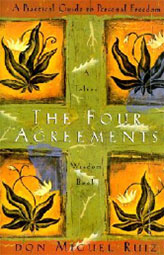
The Four Agreements: A Practical Guide to Personal Freedom (A Toltec Wisdom Book) by Don Miguel Ruiz
Don Miguel Ruiz’s “The Four Agreements,“ based on the ancient Toltec wisdom, gives us the keys to overcoming the fear, hatred, judgment and limiting beliefs imposed by society. It invites us to set out in search of our deepest, truest identity to rediscover our personal freedom and thus move towards a life of happiness, joy and unconditional love. The agreements are:
- Let your words be impeccable and speak with integrity
It’s undeniably the most important, but also the most difficult agreement to respect. Your words aren’t just a communication tool; they’re also a powerful force for creating the events of your life and chaos. That’s why it’s advisable to speak only with integrity and to affirm what you really think, avoiding backbiting and lying. - Whatever happens, don’t make it personal
This agreement denounces behaviour induced by susceptibility, such as sulking, backbiting or revenge. To avoid these behaviours, it’s important to remember that what others do or say is only a projection of their reality. It’s therefore important that you protect yourself against the opinions and actions of others. - Don’t make assumptions
Assumptions lead to misunderstandings, arguments, separations and anxiety. The third agreement urges you to be brave, ask questions and express what you really want. - Always do your best
To put this agreement into action, you need to remember that “your best” changes according to the situations, years and periods of your life. Whatever the situation, do your best to avoid regret or guilt. It sounds like a simple agreement, but in reality, it truly transforms your way of being.
The Toltec agreements are healthy because they are spiritual, common sense and humane. They enable us to adopt ways of thinking and acting that help us to flourish throughout our lives, while contributing to the evolution of society (by reducing violence and stress, for example). So, let’s do our best to apply them, at work and at home, and teach them to those around us. What a wonderful mission!
Since I read this book, which changed my way of seeing things, I try to put these four agreements into practice every day. It has become a philosophy of life and an art of living filled with kindness and wisdom.
Catherine Darphin, Specialist Graphic Designer
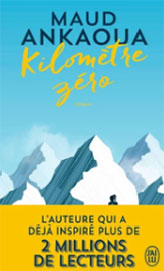
Kilometer Zero: The Path to Happiness by Maud Ankaoua
After a year of silence, Romane, a woman in her thirties, contacts her busy friend Maëlle to meet. Maëlle discovers that Romane has been diagnosed with breast cancer, a diagnosis received six months earlier during a trip to Nepal. Romane was searching for a revolutionary manuscript detailing a mindset-based healing method. An acquaintance, Jason, secured a copy, and Romane wants Maëlle to retrieve it from Kathmandu, believing it’s her only hope for recovery.
This journey quickly becomes an inner exploration for Maëlle. She confronts her fears, regrets, and doubts, and learns inspiring life philosophies. This book taught me about:
- Letting go: Accept things without trying to control them.
- Being present: Focus on the present instead of the past or future.
- Embracing the unknown: Step out of comfort zones and broaden horizons.
- Seeking inner happiness: Find joy within, not in material possessions.
- Understanding interconnectedness: Recognise the impact of actions on others and the world.
These teachings can enhance personal fulfilment and professional satisfaction at work:
- Letting go: Accept workplace stressors and focus on what you can influence.
- Being present: Practice mindfulness and be attentive to tasks and interactions.
- Embracing the unknown: Explore new methods and collaborations for growth.
- Seeking inner happiness: Find joy in small victories and meaningful work relationships.
- Understanding interconnectedness: Act responsibly, considering the impact on colleagues and society.
In summary, I really liked this because it’ a fascinating narrative that invites reflection on our own lives and the pursuit of happiness.
Marie Tosi, Digital Project Coordinator
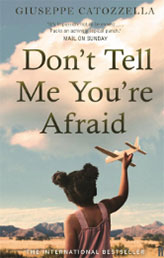
Don’t Tell Me You’re Afraid by Giuseppe Catozzella
Based on a remarkable true story, “Don’t Tell Me You’re Afraid” is a moving, inspiring novel of a life lived in hope. Samia Omar grows up in war-torn Somalia, dreaming of being a world-class sprinter. She sleeps with a photo of Mo Farah by her bed and trains hard.
After achieving a place on the national team to compete in the Beijing Olympics, she sets her sights on the 2012 games in London. But with the war encroaching on the lives of her family, Samia decides to join her sister and make the treacherous journey to Europe, putting her life and her dreams in the hands of traffickers.
What is amazing about this book (and I wept more than once reading it) is the incredible drive and resilience of this young girl who manages to make it to the Olympics despite every conceivable odd against her. As a runner myself (albeit not in this league) just to imagine running without shoes, or water, or nutrition, in a war-torn area in a culture that does not want you to run because you are a girl, is almost unbearable.
And yet Samia does all these things and hopes for more. In the end however, she is de-humanised step by step on her long and horrific journey to be free, so that she can run again in the 2012 Summer Olympics in London. The book’s true value is that you fall in love with Samia, you root for her, and she never becomes just one in a million immigrants who does not make their way. A true eye-opener and good for the soul and a call not to be so quick with hasty generalisations. But read it with a box of tissues nearby.
Mary Carey, Media Relations and Editorial Lead

The Road by Cormac McCarthy
The apocalypse has happened. Civilization is gone, along with trees, animals, and almost every other life form. The remaining human beings stumble in the cold of a desolated, ash-covered landscape, under the perpetually grey sky of what looks like a nuclear winter, scavenging for the last bits of food in the ruins of deserted cities.
In this book we follow the journey of a father and his young son in the collapsed United States, struggling to survive one day at a time on the road. They walk their way southward, hoping to find more forgiving skies. But cold and hunger are the least of the dangers they will face: cannibal groups roam unchecked, while apocalyptic cults set the hills’ crests on fire.
McCarthy’s book is not your average post-apo novel: Beyond survival, it is also a coming-of-age story, with deep moral and symbolic insight into what it means to behave like a human being, even in such dire conditions. The apocalypse is never explained, leaving the causes of the characters’ journey in the dark.
The conclusion is not that conclusive either, and one can hardly tell if their quest is a success or not. For these reasons, some may find in this short book no less than a metaphor for the human condition – which is certainly a valid interpretation. As a family man, however, what strikes me most is the relationship between the man and the boy, the father’s struggle to protect his son and keep hope alive, and the son’s efforts to make sense of this desperate world, the only one he’s ever known.
“The Road” is not such a happy reading, so you should save it for a time when your morale allows for it. But it is also an incredibly powerful and compelling story, not entirely hopeless, and definitely worth your attention – you don’t have to take just my word, you can also trust Columbia University, who awarded this novel the 2007 Pulitzer Prize for Fiction, and the New York Times, who ranks it in thirteenth position in their list of the 100 best books of the 21st century.
In 2009, director John Hillcoat turned “The Road” into a heartbreaking, acclaimed movie with Viggo Mortensen. Author Manu Larcenet also adapted it into a grim, visually striking graphic novel. And if none of these versions of “The Road” succeed in moving your stone heart, the book will still give you the joy of learning a very particular word, that McCarthy revived from centuries of oblivion – perfect for shining in society during hot summer nights!
Raphaël Junger, Publications Project Coordinator & Brand Specialist
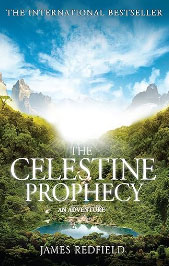
The Celestine Prophecy by James Redfield
This novel explores spiritual and philosophical ideas through a gripping plot. The story follows an unnamed protagonist who discovers an ancient Peruvian manuscript that contains nine spiritual revelations or “insights”. He then embarks on a quest to uncover these revelations, which are believed to hold the key to understanding human existence and achieving a higher state of consciousness.
Set against the backdrop of the lush Peruvian jungle, the novel blends elements of mystery and self-discovery as the protagonist encounters various characters who teach him and show him how to apply these revelations in daily life. The insights, ranging from recognising meaningful coincidences to understanding the flow of energy in human interactions, are designed to guide readers towards a deeper connection with themselves and the world around them.
“The Celestine Prophecy” emphasises the importance of inner transformation and spiritual awakening, showing how these revelations can lead to a richer, more conscious life. Its themes of synchronicity and personal growth resonated with me, inspiring a greater awareness of the subtle energies and patterns that shape our lives. I found the book’s message of interconnectedness and the pursuit of higher knowledge both uplifting and empowering.
This book is a must-read for anyone seeking to explore the deeper meanings of life. Its blend of narrative intrigue and spiritual guidance offers a unique and enriching reading experience that can inspire personal growth and a renewed sense of purpose.
Stéphane Denat, Specialist Graphic Designer
What we think

Carla Santos, Senior Digital Communications Specialist at PwC Luxembourg
Reading has always been a vital part of my life. Growing up in a small town, books were my loyal companions and windows to the world—and they still are. They made me a better writer, but most of all, they broadened my horizons and enriched my imagination. Reading taught me how to empathise with different realities and people, and how to appreciate the diversity and beauty of life. I hope our book suggestions will help you to do the same.
I have often joked that the real world never lives up to the imaginary, but even with non-fiction, there is something about jumping deep into a book that is so satisfying, like a little secret garden for the mind. Books are great companions, often challenging, and they can teach us so much about ourselves and the world around us. We hope you enjoy our suggestions and that you try one (or more of them) to take you on a literary trip while you are on vacation. See you next fall.

Mary Carey, Media Relations and Editorial Lead at PwC Luxembourg

